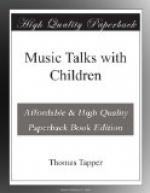It would, therefore, be necessary for this man, about whom we speak, to get the assistance of some one who knew how to write thoughts and to spell their words. Then, together, they would have to talk about the thoughts, choose proper words, form the sentences, and make all fit rightly together as a writer must who desires to be clear. But it is more than likely that the one who writes would not do all these things to the satisfaction of the other. Of this there could be but one result. The person who had the beautiful thoughts would be forever wishing that he had learned in the first days to write and to spell. Then he could do all these things for himself and show his thoughts to others exactly as he wished them to appear.
Now it is clear that some may have beautiful and valuable thoughts and not know how to write them, while others may have the ability to write without having thoughts worth preserving. Evidently what one must have are both beautiful thoughts and ability to write them.
Did you think when I read you that bit from the letter of Mendelssohn that all a composer has to do is to find in his heart just what he wants to say? As we have already discovered, that is not enough. To show you that Mendelssohn was not afraid of hard work let us read a little from another of his letters.[29] Mendelssohn had resolved to work in Germany and maintain himself. “If I find that I cannot do this, then I must leave it for London or Paris, where it is easier to get on. I see indeed where I should be more honored, and live more gaily and more at my ease than in Germany, where a man must press forward, and toil, and take no rest,—still, if I can succeed there, I prefer the latter."[30]
We can now understand that it is quite the same with word-thinkers and with tone-thinkers. Good thoughts and the proper writing of them make the classics.
Out of this thought there comes another. It is this: Great thoughts, expressed well, out of a great heart, make the works which last the longest; and still further, for one truth leads out of another. Only they can appreciate the classics who have something that is classic within them. They must have the heart true in its feeling, tender in its sentiments. Even a child can have that. They must have the mind trained in the truest and best way of expressing thought. And a child may begin to learn that. Hence we see that a child may be classic worthy. Only we must never, never, no matter what is our ability, think we are better or above others. The more talents one has the more one is expected to do and the greater duty it is.[31]
Thus far we have three truths; now here is a fourth: Some love the classics sooner and better than others because they have more power. And how do they get it? They think more (thought-making); they feel more (heart-learning); and they see more (truth-seeking).
Let us at once go back and gather together these four truths. They are important. Perhaps some of us who are willing to spend the time will learn them from memory.




